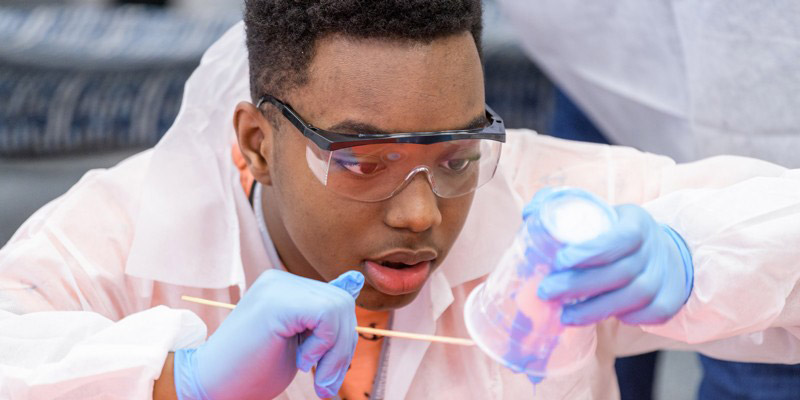Student group hosts event for aspiring chemical engineers
When you were in high school, did you know what chemical engineering was? Do you know what it is now?
Chemical engineering deals with the physical, chemical and biological transformations of matter that are the basis for making useful products.
“Chemical engineering is a major that most students don’t learn about in their regular high school classes but can lead to a meaningful career solving many of the world’s problems, including renewable energy, human health, clean water, and new materials, to name a few,” said Cathy Fromen, an assistant professor of chemical and biomolecular engineering at the University of Delaware.
Recruiting, Engaging, Advancing Chemical Engineers (REACH), a student organization sponsored by the Department of Chemical and Biomolecular Engineering at UD, is spreading the word about this field — which, according to the Bureau of Labor Statistics, is projected to have 8 percent job growth between 2016 and 2026.
REACH, advised by Joshua Enszer, associate professor of chemical and biomolecular engineering, and Megan Argoe, academic advisor for chemical and biomolecular engineering, hosted its first Engineering Day for 21 high school students at the UD’s Newark campus on March 9, 2019. This event was a successful result of collaboration between REACH and UD’s K-12 Engineering Outreach program, which is directed by academic program manager Melissa Jurist and assisted by Janna Rhodes.
“Unlike most other engineering disciplines, chemical engineering requires thinking about the transformation of the molecular nature of materials to solve big problems,” said Enszer. “In high school, students get a chance to learn about transforming materials in chemistry, but that chemistry is not usually connected to engineering. It’s important to expose students to the opportunities in this field of engineering.”
Even at high schools with strong programs in science, technology, engineering and mathematics (STEM), chemical engineering is not widely explored in engineering-focused classes. The students of REACH want to introduce chemical engineering to high schoolers so that they have every opportunity to excel, said Charlie Jabbour, a junior in the major and recruiting co-leader for REACH.
“There are students in every school who could be the next Albert Einstein or Steve Jobs,” he said.
The event organizers also conveyed that while the chemical engineering curriculum is rigorous, UD’s chemical and biomolecular engineering department offers a strong sense of support and community.
“I love the program I’m in,” said Emilia Leyes, a junior and recruiting co-leader for REACH. “I enjoy it. Of course, it’s very stressful and overwhelming at times, but what I get out of this program is amazing. We have a support system and a true sense of community here.”
In addition to mini-lectures given by faculty during Engineering Day, the students also participated in a hands-on activity about the science behind gecko feet. Geckos have sticky feet and can walk on glass due to special hairs that give their feet their tackiness. By making polymer silicon nanotubes, students can approximate the effect and hold a similar substance in their hands. Enszer and Fromen gave a lesson to draw connections between the theory and the application.
“This is a great way to get kids to think about things in the natural world that they could use as scientists,” said Jabbour.
Fromen appreciated the opportunity to show local high school students what is happening in chemical engineering at UD. “It was equally as exciting to see our current UD students directing the program practice their STEM communication skills and spread their love of chemical engineering,” she said.
The participants enjoyed the experience. Given the opportunity to provide anonymous feedback, one high school student participant wrote: “I liked the experimentation and learning how people use chemical engineering to solve problems.”
Events such as these are beneficial for both participants and organizers. “When UD K-12 Engineering works with undergraduate and graduate students to help reach the K-12 community, we are accomplishing two things,” said Jurist. “First, we are providing a near-peer mentor for the K-12ers who are in our programs. It is great for kids to see someone close to their age in a potential career trajectory. Second, it instills the import, for the UD students, of being able to bring your science to everyone (i.e., being able to explain your work to laypeople/younger people), it helps metacognition (the ability to understand your own thought processes), while it brings home the value of encouraging the next generation of engineers. It’s a synergy that benefits everyone.”

